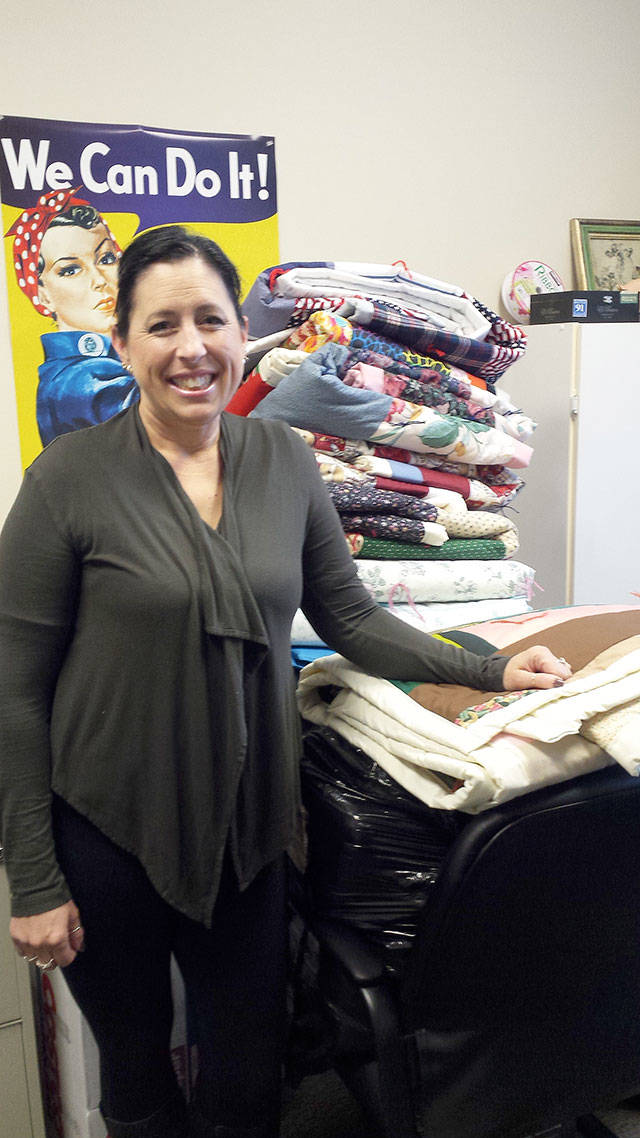There’s someone new in the driver’s seat at Sumner’s Exodus Housing.
Tonya Tunnell-Thornhill, the new executive director of the non-profit that aims to help families escape domestic violence, came in at a time when funding was being slashed at many domestic violence programs in the county.
Tunnell-Thornhill started working with Exodus Housing as a volunteer more than a decade ago after she graduated from WSU.
“I started volunteering with four different agencies because I wanted to gain some experience in social services,” the Buckley resident said. “This is my second career… I used to do hair.”
Wanting to get into social services led her many places, including Plateau Outreach Ministries in Enumclaw.
“I wasn’t entirely sure where I wanted to go. I had a friend that got out of a DV relationship and she stayed at our house for a few months, and at that point I thought, I definitely need to be in social services,” Tunnell-Thornhill continued. “I still wasn’t sure what genre, but it really didn’t matter to me, I just wanted to get my foot in the door somewhere.”
Eventually, a paid position opened up at Exodus , and she’s stuck with it ever since.
“I’ve worked almost every job in-between, with the exception of the finance manager,” she said.
Over the last several years, formed executive director Joe O’Neil was training her to take over his position on the off-chance he’d leave for another job.
O’Neil took that chance to relocate help with homeless veterans in Las Vegas last December, and made Tunnell-Thornhill the new head of the organization.
FUNDING CUT IN HALF
According to Tunnell-Thornhill, the state government and Pierce County switch their focus on which social programs get funding every few years.
At the end of 2016, it looked like government funds would be more allocated to programs that addressed chronic homelessness, but to fund those programs more, funding from other social programs — Like Exodus House — were cut.
“We lost almost half of what we would normally get.,” Tunnell-Thornhill said. In 2015, Exodus House had a budget for more than $900,000, but in 2016, it was closer to $540,000.
To compensate, Exodus House had to cut staffing in half (from five to three), but what was drastically reduced was the number of families the program was able to aid as funding ran out.
Tunnell-Thornhill said back in 2015, they were helping somewhere close to 130 families, but the number has shrunk closer to 70.
A bump in funding mid-year allowed Tunnell-Thornhill to hire a fourth staff member to help the non-profit with their accounting, but unless Exodus Housing receives more funding in 2018, she said that position will have to end as well.
WHAT DOES EXODUS DO?
Exodus House is a rapid rehousing program, which means they work at trying to get families escaping a domestic violence situation rehoused, either in a home or apartment with a lease in their name, as quickly as possible.
This is in contrast to transitional housing programs, which typically house families in apartments owned and operated by a non-profit.
The difference is mainly who controls the building after families leave the programs. In transitional housing programs, families typically leave their temporary home to find another, while in rapid rehousing programs, the lease or housing contract is in their name, not in the non-profit’s.
Tunnell-Thornhill said the success rates of rehousing between transitional housing and rapid rehousing are comparable, but the costs are not.
She said studies have shown the difference between the two program types are that “rapid rehousing forces families to get in and start moving right away, whereas in transitional housing program, they can sit in those programs forever and do nothing, which means they’re sucking up a lot more dollars. Rapid rehousing is just as successful as transitional housing, but a lot less expensive.”
Tunnell-Thornhill said the average time families spend with Exodus Housing is six months.
Other benefits to rapid rehousing, she said, include families building up their own relationship with a landlord and improving their rental history and credit so they can continue to be successful after they leave Exodus Housing programs.”
COMMUNITY SUPPORT
While public contracts fund Exodus Housing’s rental assistance programs, there are many ways families escaping a domestic violence situation still need help.
Tunnell-Thornhill often applies for private grants that assist the program purchasing hygiene products, educational materials and even work tools that would continue to help families become self-sufficient.
“As families are moving into our program and into housing, sometimes they don’t have anything, because maybe they fled and they didn’t have a chance to get anything,” she said. “They’re sometimes lucky if they can grab a couple bags of clothing for them and their kids, so for us to be able to have some of that stuff to get them started is really nice.”
Exodus Housing recently completed a toy drive for children in the program, and began giving gifts to families last week.
But throughout the year, families often request everything from toilet paper and tampons (the vast majority of people escaping a domestic violence situation are women) to college textbooks, cooking utensils, and work clothes.
The items families need are always changing, Tunnell-Thornhill said, because every family is different — she calls it “progressgive engagement.”
“What one family may want, another family may not need,” she said.“It’s not a cookie cutter.”
Community members can help families with Exodus Housing can ask to sponsor a family and help them purchase what they need, Tunnell-Thornhill said.
A list of commonly-requested items is online at http://exodushousing.org/wordpress/donate/, or you can call the non-profit at 253-862-6808.
Tunnell-Thornhill said donations can be dropped off at their 15318 Washington Street location in Sumner, but suggests calling first to make sure someone is staffing the office.
To apply for program assistance, families must apply through Pierce County’s Associated Ministries at https://associatedministries.org/.


